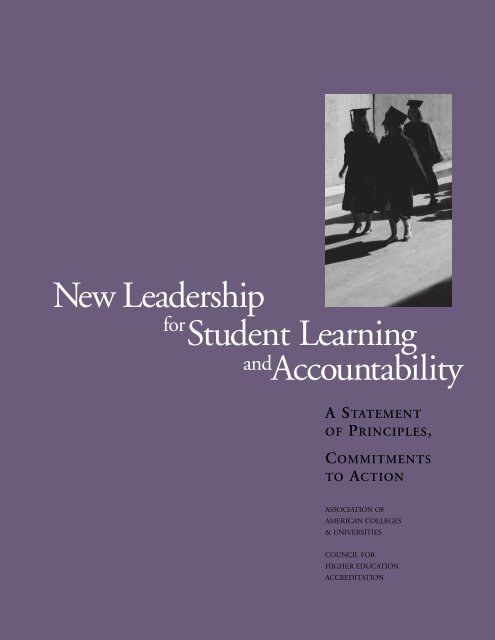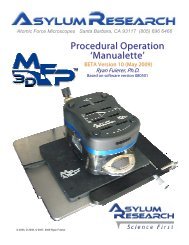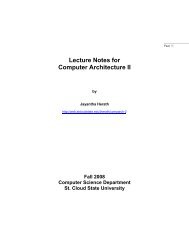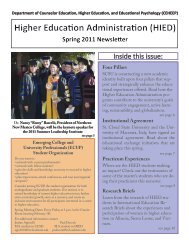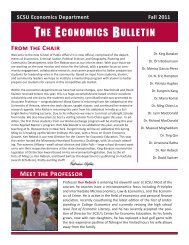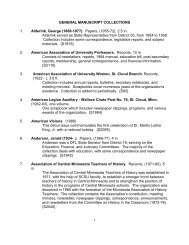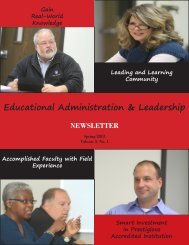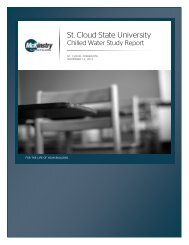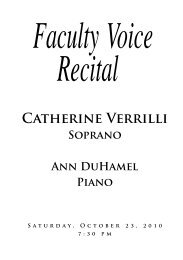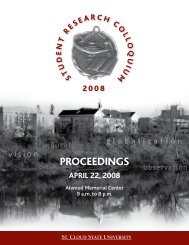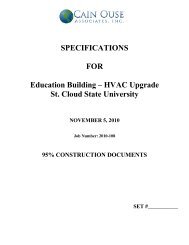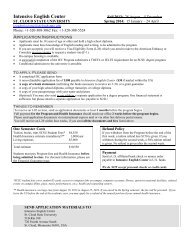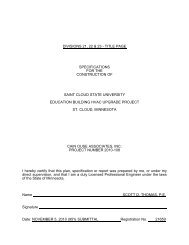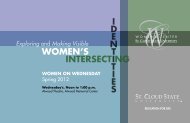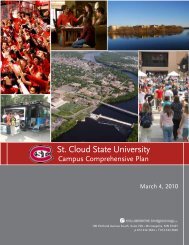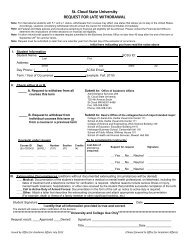New Leadership for Student Learning an Accountability
New Leadership for Student Learning an Accountability
New Leadership for Student Learning an Accountability
Create successful ePaper yourself
Turn your PDF publications into a flip-book with our unique Google optimized e-Paper software.
<strong>New</strong> <strong>Leadership</strong><br />
<strong>for</strong><strong>Student</strong> <strong>Learning</strong><br />
<strong>an</strong>d<strong>Accountability</strong><br />
A STATEMENT<br />
OF PRINCIPLES,<br />
COMMITMENTS<br />
TO ACTION<br />
ASSOCIATION OF<br />
AMERICAN COLLEGES<br />
& UNIVERSITIES<br />
COUNCIL FOR<br />
HIGHER EDUCATION<br />
ACCREDITATION
With support from the Teagle<br />
Foundation, <strong>New</strong> <strong>Leadership</strong> <strong>for</strong><br />
<strong>Student</strong> <strong>Learning</strong> <strong>an</strong>d <strong>Accountability</strong>:<br />
A Statement of Principles, Commitments<br />
to Action was developed jointly<br />
by the Association of Americ<strong>an</strong><br />
Colleges <strong>an</strong>d Universities (AAC&U)<br />
<strong>an</strong>d the Council <strong>for</strong> Higher<br />
Education Accreditation (CHEA) in<br />
dialogue with m<strong>an</strong>y colleagues,<br />
including leaders in the nation’s<br />
major higher education <strong>an</strong>d accreditation<br />
associations. It has been<br />
printed <strong>for</strong> use in higher education<br />
meetings. AAC&U <strong>an</strong>d CHEA<br />
encourage its wide dissemination,<br />
look <strong>for</strong>ward to vigorous debate in<br />
m<strong>an</strong>y settings, <strong>an</strong>d to the implementation<br />
of its recommendations.<br />
© 2008 by the Association of Americ<strong>an</strong><br />
Colleges <strong>an</strong>d Universities <strong>an</strong>d the Council<br />
<strong>for</strong> Higher Education Accreditation.<br />
All rights reserved.<br />
Cover Photo: Indi<strong>an</strong>a University,<br />
photographer Chris Meyer, IU Homepages<br />
Inside Front Photo: Dominic<strong>an</strong> University<br />
Association<br />
of Americ<strong>an</strong><br />
Colleges <strong>an</strong>d<br />
Universities
<strong>New</strong> <strong>Leadership</strong><br />
<strong>for</strong><strong>Student</strong> <strong>Learning</strong><br />
<strong>an</strong>d<strong>Accountability</strong><br />
P REFACE<br />
A STATEMENT OF PRINCIPLES, COMMITMENTS TO ACTION<br />
The United States has been exceptionally well served by its varied, accessible,<br />
<strong>an</strong>d intellectually self-directed colleges <strong>an</strong>d universities. Our tradition of<br />
intellectual freedom <strong>an</strong>d institutional diversity has made the Americ<strong>an</strong> system<br />
of higher education the envy of the world.<br />
The higher education community is determined to maintain this leadership.<br />
We face some <strong>for</strong>midable challenges. Other nations have surpassed the United<br />
States in terms of the percentages of their populations achieving postsecondary<br />
degrees. Our levels of attainment have remained static, primarily because college<br />
access <strong>an</strong>d degree completion rates are still sharply stratified by income <strong>an</strong>d ethnicity.<br />
As the demographic composition of our society continues to ch<strong>an</strong>ge rapidly,<br />
we must reverse these inherited inequities. Moreover, most Americ<strong>an</strong>s will need<br />
education beyond high school to prosper economically. The world is dem<strong>an</strong>ding<br />
more of college graduates th<strong>an</strong> ever be<strong>for</strong>e, but students’ levels of achievement<br />
are not increasing accordingly.<br />
Finally, <strong>an</strong>d perhaps most import<strong>an</strong>t, higher education has <strong>an</strong> obligation to our<br />
democracy as well as our economy. A college degree should ensure that graduates<br />
are well prepared to contribute to society as knowledgeable, engaged, <strong>an</strong>d<br />
active citizens.<br />
In order to meet these challenges, we in the higher education community must<br />
continually seek, <strong>an</strong>d find, better ways to reach our common goal of helping all<br />
the students we serve realize their full potential. We need to make clear, <strong>for</strong> ourselves<br />
<strong>an</strong>d our various constituencies, what our aims are, how we seek to achieve<br />
them, <strong>an</strong>d how well we do so. This requires continuing ef<strong>for</strong>ts in m<strong>an</strong>y quarters<br />
to make higher education a challenging <strong>an</strong>d rigorous experience <strong>for</strong> all students—<br />
<strong>for</strong> their benefit <strong>an</strong>d society’s as well. To do so, we in higher education must<br />
const<strong>an</strong>tly monitor the quality of student learning <strong>an</strong>d development, <strong>an</strong>d use<br />
the results both to improve achievement <strong>an</strong>d to demonstrate the value of our<br />
work to the public. We must not settle <strong>for</strong> <strong>an</strong>ything less.<br />
As leaders of org<strong>an</strong>izations representing over three thous<strong>an</strong>d colleges <strong>an</strong>d universities,<br />
we commit ourselves to work together—with our member institutions <strong>an</strong>d<br />
other higher education org<strong>an</strong>izations—to implement the following principles<br />
<strong>an</strong>d actions <strong>for</strong> me<strong>an</strong>ingful educational accountability.<br />
1
NEW LEADERSHIP FOR STUDENT LEARNING AND ACCOUNTABILITY<br />
P RINCIPLES<br />
1<br />
The primary responsibility <strong>for</strong> achieving excellence falls on colleges <strong>an</strong>d<br />
universities themselves. Accrediting org<strong>an</strong>izations have played a signific<strong>an</strong>t<br />
role in adv<strong>an</strong>cing the assessment of learning outcomes <strong>an</strong>d must continue to<br />
do so while encouraging institutions to set the highest possible st<strong>an</strong>dards.<br />
Phil<strong>an</strong>thropic org<strong>an</strong>izations, scholarly <strong>an</strong>d professional associations, honorary<br />
societies, <strong>an</strong>d others concerned with higher education also have a responsibility<br />
to encourage, indeed to insist upon, systematic improvement. Governments,<br />
state <strong>an</strong>d federal, <strong>an</strong>d governing boards also share the responsibility to support<br />
the drive <strong>for</strong> high st<strong>an</strong>dards <strong>an</strong>d continuous improvement in higher education.<br />
Within this context of shared responsibility, however, colleges <strong>an</strong>d universities<br />
must themselves take the lead in seeing that Americ<strong>an</strong> higher education maintains<br />
its position of global leadership.<br />
2<br />
To that end, each college <strong>an</strong>d university (<strong>an</strong>d major divisions, schools, <strong>an</strong>d<br />
programs within them) should develop ambitious, specific, <strong>an</strong>d clearly stated<br />
goals <strong>for</strong> student learning appropriate to its mission, resources, tradition, student<br />
body, <strong>an</strong>d community setting. M<strong>an</strong>y accrediting bodies already require setting<br />
such goals, <strong>an</strong>d the import<strong>an</strong>ce of doing so should be communicated widely.<br />
While these educational goals will vary from institution to institution, they should<br />
include the enrichment of both individual lives <strong>an</strong>d our democratic society as a<br />
whole through the study of science, social science, the hum<strong>an</strong>ities, <strong>an</strong>d the arts.<br />
By setting clear <strong>an</strong>d ambitious goals, each institution c<strong>an</strong> determine <strong>an</strong>d communicate<br />
how it c<strong>an</strong> best contribute to the realization of the potential of all its students.<br />
3<br />
Each college <strong>an</strong>d university should gather evidence about how well students<br />
in various programs are achieving learning goals across the curriculum <strong>an</strong>d<br />
about the ability of its graduates to succeed in a challenging <strong>an</strong>d rapidly ch<strong>an</strong>ging<br />
world. The evidence gathered through this process should be used by each<br />
institution <strong>an</strong>d its faculty to develop coherent, effective strategies <strong>for</strong> educational<br />
improvement. Accrediting org<strong>an</strong>izations should likewise evaluate institutions by<br />
their per<strong>for</strong>m<strong>an</strong>ce in accord with institutional goals <strong>an</strong>d develop consistent<br />
strategies <strong>for</strong> summarizing <strong>an</strong>d making public their findings.<br />
2
A STATEMENT OF PRINCIPLES, COMMITMENTS TO ACTION<br />
4<br />
Each college <strong>an</strong>d university should provide in<strong>for</strong>mation about its basic<br />
characteristics, clearly communicate its educational mission, <strong>an</strong>d describe its<br />
strategies <strong>for</strong> achieving its educational goals <strong>an</strong>d their effectiveness. Both applic<strong>an</strong>ts<br />
<strong>an</strong>d enrolled students, among others, need to underst<strong>an</strong>d the educational<br />
mission <strong>an</strong>d goals as well as how broadly <strong>an</strong>d deeply students are learning with<br />
respect to them. Hence, in addition to basic data about <strong>an</strong> institution, students <strong>an</strong>d<br />
others should have access to <strong>an</strong> easily intelligible summary of conclusions drawn<br />
from evidence about student learning <strong>an</strong>d a clear description of the process of<br />
continuous improvement on a campus. Such in<strong>for</strong>mation <strong>an</strong>d evidence will help<br />
the public learn more about the multiple aims of college study <strong>an</strong>d about<br />
campus priorities <strong>for</strong> strengthening learning. And it will enable the faculty <strong>an</strong>d<br />
staff, in partnership, to focus on shared goals <strong>for</strong> strengthening the quality of<br />
student attainment.<br />
5<br />
Underst<strong>an</strong>ding that the federal government has a responsibility to see that<br />
its funds are properly used, we recognize the import<strong>an</strong>ce of its careful<br />
monitoring of expenditures of its funds <strong>an</strong>d its reli<strong>an</strong>ce on independent accrediting<br />
org<strong>an</strong>izations to encourage systematic improvement of educational results.<br />
Within this context, we strongly endorse the principle that quality st<strong>an</strong>dards must<br />
be set <strong>an</strong>d met by institutions themselves <strong>an</strong>d not by external agencies. At the<br />
same time, we also call <strong>for</strong> continued ef<strong>for</strong>ts to reduce the costs <strong>an</strong>d distractions<br />
imposed by unproductive governmental regulation.<br />
6<br />
As educational associations, we are commited to high st<strong>an</strong>dards <strong>for</strong> our<br />
institutions of higher education <strong>an</strong>d their students. To achieve this new<br />
configuration of Americ<strong>an</strong> higher education with its emphasis on tr<strong>an</strong>sparency <strong>an</strong>d<br />
accountability, colleges <strong>an</strong>d universities will need ongoing support from governmental<br />
agencies, phil<strong>an</strong>thropic foundations, corporations, <strong>an</strong>d private donors.<br />
We will make every ef<strong>for</strong>t to demonstrate that such support results in increased<br />
learning, more creative <strong>an</strong>d adaptable graduates, <strong>an</strong>d a stronger competitive<br />
situation <strong>for</strong> the country as a whole.<br />
Quality<br />
st<strong>an</strong>dards must be<br />
set <strong>an</strong>d met by<br />
institutions themselves<br />
<strong>an</strong>d not by<br />
external agencies.<br />
3
NEW LEADERSHIP FOR STUDENT LEARNING AND ACCOUNTABILITY<br />
ACTIONS<br />
Since our goal is nothing less th<strong>an</strong> a comprehensive, broadly based ef<strong>for</strong>t to address<br />
the vital issues of tr<strong>an</strong>sparency <strong>an</strong>d accountability through rigorous attention<br />
to the per<strong>for</strong>m<strong>an</strong>ce of our colleges <strong>an</strong>d universities, we commit ourselves to take<br />
specific actions <strong>an</strong>d to encourage our colleagues throughout higher education to join<br />
with us in improving student learning.<br />
1<br />
We will present these principles to our members <strong>an</strong>d others <strong>an</strong>d encourage<br />
a vigorous discussion with the goal of implementing them on campuses as<br />
fully as possible in the near future.<br />
2<br />
3<br />
We will disseminate this document as widely as possible <strong>an</strong>d encourage<br />
broad discussion of it.<br />
We will keep pressing <strong>for</strong> the highest possible st<strong>an</strong>dards <strong>an</strong>d expectations<br />
<strong>for</strong> student learning at every level. We will work with our members <strong>an</strong>d<br />
others to help each college <strong>an</strong>d university develop, articulate <strong>an</strong>d make public its<br />
mission <strong>an</strong>d educational goals, <strong>an</strong>d to encourage the full realization of student<br />
potential through higher levels of student engagement, learning, <strong>an</strong>d achievement.<br />
4<br />
We welcome the progress various associations of colleges <strong>an</strong>d universities<br />
have made in developing widely agreed upon templates that will<br />
provide college applic<strong>an</strong>ts, their parents, legislators, <strong>an</strong>d the general public with<br />
import<strong>an</strong>t data about demographics, admission <strong>an</strong>d completion in<strong>for</strong>mation,<br />
costs <strong>an</strong>d fin<strong>an</strong>cial aid, student engagement, <strong>an</strong>d other relev<strong>an</strong>t in<strong>for</strong>mation.<br />
We will continue to give high priority to making such import<strong>an</strong>t in<strong>for</strong>mation<br />
readily accessible.<br />
4
A STATEMENT OF PRINCIPLES, COMMITMENTS TO ACTION<br />
5<br />
We will encourage our members to augment such templates with clear<br />
descriptions of their educational goals <strong>for</strong> student accomplishment <strong>an</strong>d<br />
with in<strong>for</strong>mation about the practices they use to foster, assess <strong>an</strong>d report student<br />
attainment of those goals.<br />
6<br />
We commend those org<strong>an</strong>izations <strong>an</strong>d their phil<strong>an</strong>thropic supporters that<br />
have in recent years developed promising me<strong>an</strong>s of assessing import<strong>an</strong>t<br />
outcomes of higher education. Underst<strong>an</strong>ding that st<strong>an</strong>dardized measures currently<br />
address only a small part of what matters in college, we will work with foundations<br />
<strong>an</strong>d campus partners to subst<strong>an</strong>tially exp<strong>an</strong>d the array of educationally valid<br />
<strong>an</strong>d useful me<strong>an</strong>s—qualitative as well as qu<strong>an</strong>titative—of assessing the full r<strong>an</strong>ge of<br />
learning outcomes envisioned in this document.<br />
7<br />
Recognizing that setting high st<strong>an</strong>dards is not the same as st<strong>an</strong>dardization,<br />
we also support <strong>an</strong>d encourage the development of assessments of student<br />
attainment that are <strong>an</strong>chored in the curriculum that faculty teach. Excellent<br />
work of this sort is already underway on m<strong>an</strong>y campuses, through assessments<br />
of common assignments, student portfolios, senior projects <strong>an</strong>d similar ef<strong>for</strong>ts.<br />
We applaud these institutions <strong>an</strong>d their faculty <strong>for</strong> taking the lead in creating<br />
<strong>an</strong>d adopting ever-improving <strong>for</strong>ms of evaluation. We will publicize their ef<strong>for</strong>ts<br />
<strong>an</strong>d provide support <strong>an</strong>d active assist<strong>an</strong>ce to help others do the same.<br />
8<br />
We will regularly report to the public on the overall progress made in<br />
achieving these actions.<br />
We st<strong>an</strong>d ready to be judged by the high st<strong>an</strong>dards this document sets <strong>for</strong><br />
Americ<strong>an</strong> higher education. Our students deserve nothing less.<br />
Develop clear<br />
descriptions of<br />
educational goals...<br />
<strong>an</strong>d assessments<br />
<strong>an</strong>chored in the<br />
curriculum that<br />
faculty teach.<br />
5
Association<br />
of Americ<strong>an</strong><br />
Colleges <strong>an</strong>d<br />
Universities<br />
1818 R St. NW, Washington DC 20009<br />
202-387-3760 • www.aacu.org<br />
AAC&U is the leading national association<br />
concerned with the quality, vitality, <strong>an</strong>d<br />
public st<strong>an</strong>ding of undergraduate liberal<br />
education. Its members are committed to<br />
extending the adv<strong>an</strong>tages of a liberal<br />
education to all students, regardless of<br />
academic specialization or intended<br />
career. Founded in 1915, AAC&U now<br />
comprises more th<strong>an</strong> 1,150 accredited<br />
public <strong>an</strong>d private colleges <strong>an</strong>d universities<br />
of every type <strong>an</strong>d size.<br />
AAC&U functions as a catalyst <strong>an</strong>d<br />
facilitator, <strong>for</strong>ging links among presidents,<br />
administrators, <strong>an</strong>d faculty members who<br />
are engaged in institutional <strong>an</strong>d curricular<br />
pl<strong>an</strong>ning. Its mission is to rein<strong>for</strong>ce the<br />
collective commitment to liberal education<br />
at both the national <strong>an</strong>d local levels <strong>an</strong>d<br />
to help individual institutions keep the<br />
quality of student learning at the core of<br />
their work as they evolve to meet new<br />
economic <strong>an</strong>d social challenges.<br />
In<strong>for</strong>mation about AAC&U membership,<br />
programs, <strong>an</strong>d publications c<strong>an</strong> be<br />
found at www.aacu.org.<br />
One Dupont Circle NW, Suite 510<br />
Washington, DC 20036<br />
202-955-612 • www.chea.org<br />
The Council <strong>for</strong> Higher Education<br />
Accreditation (CHEA) is <strong>an</strong> institutional<br />
membership org<strong>an</strong>ization that coordinates<br />
institutional <strong>an</strong>d programmatic accreditation<br />
in the United States. CHEA is a<br />
national advocate <strong>an</strong>d institutional voice<br />
<strong>for</strong> self-regulation of academic quality<br />
through accreditation. CHEA represents<br />
the interests of its members to the federal<br />
government on matters of accreditation<br />
<strong>an</strong>d academic quality, reviews <strong>an</strong>d affirms<br />
(“recognizes”) the quality of accrediting<br />
org<strong>an</strong>izations <strong>an</strong>d provides a r<strong>an</strong>ge of<br />
membership <strong>an</strong>d other services. Founded<br />
in 1996, approximately 3,000 degreegr<strong>an</strong>ting<br />
colleges <strong>an</strong>d universities are now<br />
members of CHEA. For additional<br />
in<strong>for</strong>mation, please contact CHEA<br />
at chea@chea.org or visit the CHEA<br />
Web site at www.chea.org.


